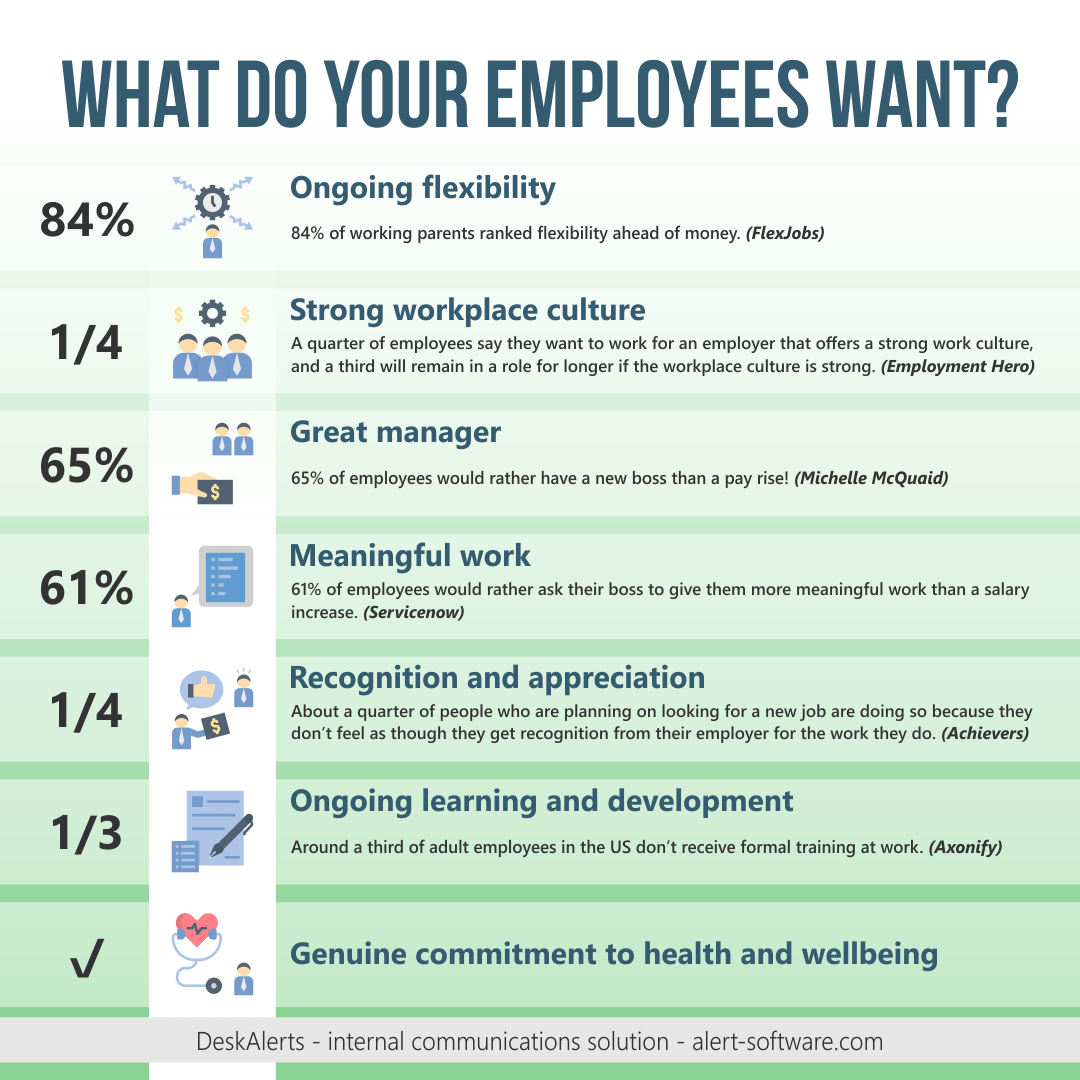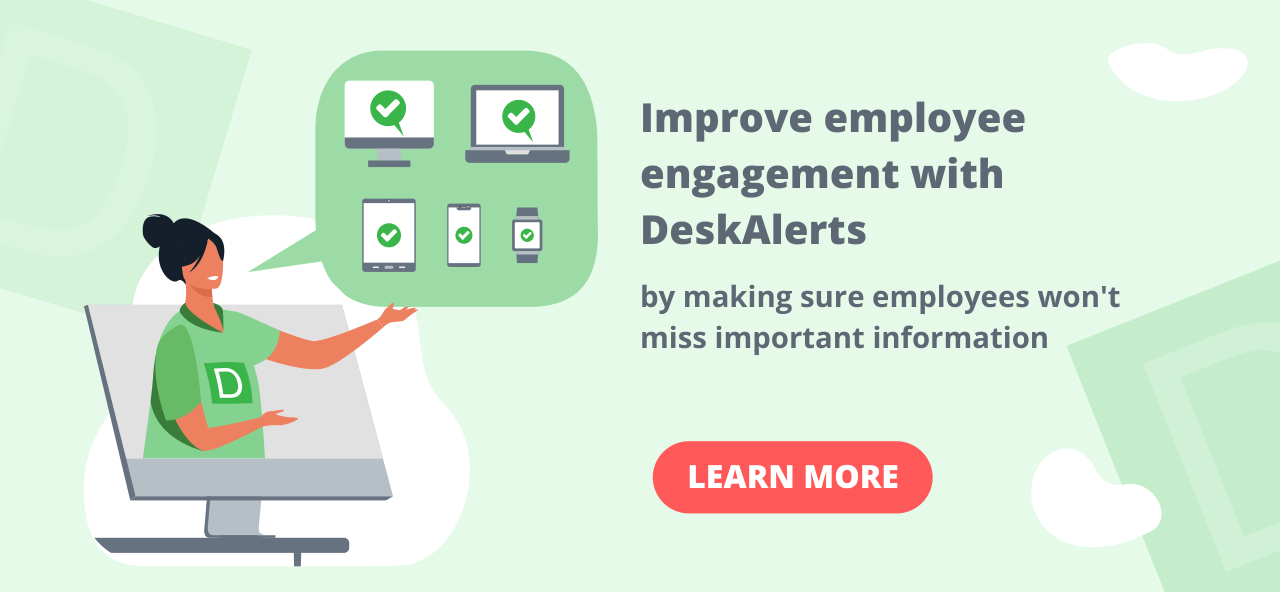6 min read
Bank Training Programs For Employees
In today's rapidly evolving financial landscape, banks must stay ahead of industry changes, regulatory updates, and technological advancements....

People spend a significant proportion of their lives at work, so it is only natural that they would like the experience to be as pleasant as possible. Understanding what employees want from their employer and their workplace is important. Delivering on employee needs not only helps with attracting and retaining great talent, but it will help to boost morale, engagement, productivity and profits.
Once upon a time, many people were content with a 9-5 job and a paycheck. The world of work has evolved, and employees have wants and needs that go above and beyond just getting paid. Just as employers have expectations of employees, employees have expectations of employers.
When you are in a competitive field, you need to be aware of these factors to ensure that you can attract people with more than just money. Employees are looking for their employers to deliver things that will help them to be successful in their professional lives as well as their personal lives.
What are employees looking for? These are the top 7 things:
As the traditional 9-5 way of life is disappearing and technology has fast-tracked new ways of working, employees want to be able to access flexible solutions that will help them with their work/life balance. This can include teleworking, flexible work schedules and extra personal time off so that they can.
A FlexJobs survey found that 84% of working parents ranked flexibility ahead of money.
Unfortunately, many companies are still resistant to this idea and think people can only be productive if they are sitting at a desk in a traditional office.
Employees are increasingly looking to work for an employer that offers staff a strong company culture. This includes benefits, as well as teamwork and activities that they can participate in with colleagues.
According to a study by Employment Hero, a quarter of employees say they want to work for an employer that offers a strong work culture, and a third will remain in a role for longer if the workplace culture is strong.
There’s a saying that people don’t leave jobs. They leave bosses. Anyone who has ever had a terrible boss knows that they’re extremely lucky when they have a good one. When you have a difficult relationship with your boss, you tend to start looking for new opportunities elsewhere. Bad bosses can vary: some are downright toxic and mean and bully and harass everyone around them. Others can be well-meaning but fail to provide leadership, feedback, guidance and other qualities people look for in a manager.
Good bosses gain loyalty from employees and help to keep morale up.
A study by researcher Michelle McQuaid found that 65% of employees would rather have a new boss than a pay rise!

Meaningful work is a term used to describe work that makes people feel like they’re making a positive contribution to a worthwhile goal. It might be the company’s goals or their own personal career aspirations. Employees increasingly value being able to reach their full potential while at work and don’t enjoy menial or boring tasks.
A Servicenow study found that 61% of employees would rather ask their boss to give them more meaningful work than a salary increase.
People like to be appreciated for what they do for others, including in the workplace. But people aren’t generally psychic: they don’t know that you value their contribution unless you let them know.
A survey by software company Achievers found that about a quarter of people who are planning on looking for a new job are doing so because they don’t feel as though they get recognition from their employer for the work they do.
Read more about appreciation mail to employees.
Employees appreciate being able to access training and learning and development opportunities as part of their job. This can help them do their current role more efficiently and effectively, and it can also help them develop their skill-sets so that they can advance their careers.
According to a study by Axonify, around a third of adult employees in the US don’t receive formal training at work.
Lip-service doesn’t cut it. If your employees are stressed out, burned out, or just plain unhappy in the workplace, simply telling them you’re committed to their health and wellbeing will be received cynically. They want more than just some words from you and fruit in the employee break room.
In a recent conversation with an old colleague, he advised me that he spent two hours on a company-wide town hall meeting that was called in response to some horrific staff satisfaction survey results.
The CEO of his company spruiked a lot of changes to the way that work would be done in that organization from now on: the standouts for my old colleague being no more meetings between noon and 2 pm so that employees could get a lunchbreak and no more overtime unless it was urgent. He told me that he has had middle-level managers trying to make him attend lunchtime meetings several times since the CEO announced the ban, and he’s been made to do overtime every day by his own manager since the edict was handed down.
The company in question has around 2000 employees in about 20 different locations. There’s obviously a real disconnect with what the CEO says and what managers down the chain are doing. It is extremely doubtful that the engagement statistics will change based on this townhall meeting.
My old colleague is actively looking for a new job.
The COVID-19 pandemic has shaken up workplaces and has changed the way that we work – possibly forever. Many employees who were previously denied flexibility in their jobs were able to demonstrate that they could successfully carry out their work remotely and increase their work/life balance while doing so, so these excuses aren’t going to cut it anymore.
With many employers expecting people to return to the office and the old ways of doing things, employees are increasingly re-evaluating what is important to them when it comes to work.
Many people no longer want to commute long distances on packed trains and busses. Others find not being in the office is less stressful and they get to sleep longer each morning. And there are health and wellbeing benefits many organizations rolled out during the pandemic that employees are reluctant to rescind. COVID has also helped some employees to accelerate their learning and development as many conferences and training courses have gone online and are less costly to attend and can often be done at more suitable times than usually offered.
Many people have had the experience in the past of applying for a job with an employer that promises “flexibility” on its website. Only the employer never delivers when the employee tries to access it. COVID-19 means people will be less tolerant of this: if you don’t offer meaningful flexibility, there’s a good chance the employee will decamp in the direction of a competitor who will.
According to the US Bureau of Labor Statistics, August 2021 was a record-breaking month in terms of the number of Americans who quit their jobs – 4.3 million (2.9% of the nation’s entire workforce).
This phenomenon is being seen in other countries and is expected to continue into 2022. It’s being called “The Great Resignation” and is being attributed to how the pandemic has changed what people want. Not only do they want more flexibility, but they have come to re-evaluate other priorities such as spending time with family, their health and safety and whether they want to remain in their career/industry in the long-term.

There’s no one-size-fits-all solution for employees of a company. Different industries and different generations may have different needs. You might find that what your own employees want varies from the list above. You shouldn’t guess at it: ask your employees. You can do this by sending surveys, running focus groups, or having one-on-one or small group meetings to gather the data.
Once you know what your employees want, you should communicate your findings: openness and transparency are the cornerstones of building trust. Employees who have been disappointed by poor leadership many times over the course of their careers will be cynical, so you need to keep this in mind.
Whatever you end up delivering needs to be genuine, no strings attached, no lip service. Your entire leadership team needs to be on board because, as we saw with the story about my former colleague’s workplace, there will be unhappiness and dissent if the actions don’t match the words.
***
By understanding what employees are looking for in an employer and actively committing to delivering these initiatives, you are destined to have a productive and successful workplace for the employee and employers alike.
Today’s employees want a workplace experience that is fulfilling, just as they seek fulfillment in their personal lives and relationships. They want to ensure that their work and the rest of their lives are balanced and have flexibility and support offered by their employer. They want to be able to trust their company’s leadership and work in an environment where they can contribute proactively. They also want to be adequately compensated to help reduce financial stress in their personal lives. Employers need to understand this: when their people thrive, so too can their business.
Employees overall are looking at workplaces that value their own personal priorities such as flexible ways of working, career development, the ability to design their careers and diversity in teems. People want to have more say on when and where they work and want to be recognized for the work they deliver and what they achieve for the company. Employees increasingly want to be able to work independently and know that their employer trusts them to do the work. People are no longer willing to be micromanaged or treated like children in the workplace.
New employees have their own specific set of wants and needs. They want to know that they are joining a company that respects them, their experience and their time. They want simple, easy-to-access resources that are available for them as soon as they begin working. They want an onboarding process (including online onboarding) that isn’t arduous that helps them to ease into being part of the company. They also want to begin forging productive and collaborative relationships with existing team members and want to feel included.

6 min read
In today's rapidly evolving financial landscape, banks must stay ahead of industry changes, regulatory updates, and technological advancements....

7 min read
Employee safety programs are not just a regulatory requirement; they are a strategic imperative for modern businesses. By prioritizing safety,...